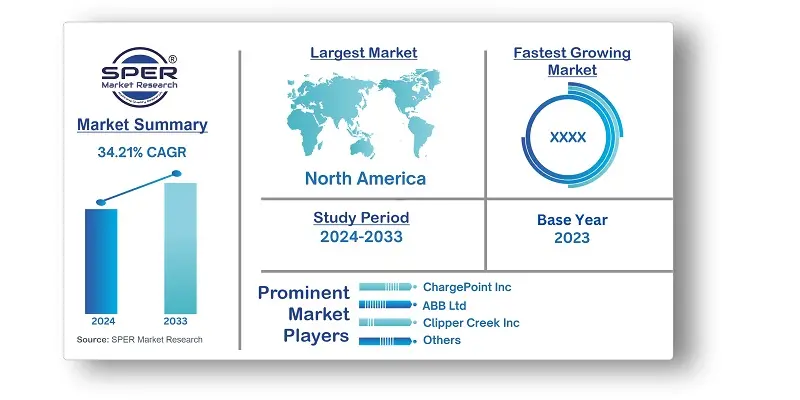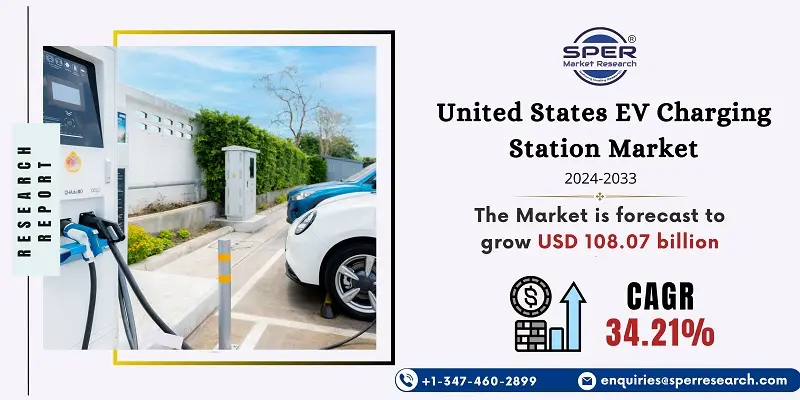
United States EV Charging Station Market Growth, Trends, Share, Size, Revenue and Future Outlook
United States EV Charging Station Market Size- By Charger Type, By Connector Type, By Level of Charging, By Connectivity, By Application and Region, Competitive Strategies and Segment Forecast to 2033
| Published: Jul-2024 | Report ID: AMIN24153 | Pages: 1 - 107 | Formats*: |
| Category : Automotive & Transportation | |||
- December 2023; The Volkswagen Group declared its arrangement to take on Tesla's North American Charging Standard (NACS) to consolidate the charging sheets by NACS in their forthcoming vehicle brands, including Audi, Porsche, and Scoun Motors across the US from 2025. The cooperation expects to work with Volkswagen's clients to access more than 15,000 Tesla's quick charging stations cross country, explicitly, the Supercharger organization.
- February 2024; ChargePoint, a main charging arrangements supplier based out of the US, reported its coordinated effort with EnTech Arrangements and Wells Fargo to offer supporting answers for business clients ready to partake in building charging stations for EV armadas. Further, the organization expressed that the subsidizing will give reasonable supporting answers for clients, which packages the EnTech Arrangements eSkid with ChargePoint chargers, establishment, guarantee, and programming.


| Report Metric | Details |
| Market size available for years | 2020-2033 |
| Base year considered | 2023 |
| Forecast period | 2024-2033 |
| Segments covered | By Charger Type, By Connector Type, By Level of Charging, By Connectivity, By Application |
| Regions covered | West Coast, Northeast, Midwest, South, Pacific Northwest. |
| Companies Covered | ABB Ltd, bp pulse, ChargePoint Inc, Clipper Creek Inc, Delta Electronics Inc, General Electric Company, Leviton Manufacturing Co. Inc, Sema Connect Inc, Tesla Inc, Webasto Group. |
- Automakers and EV Manufacturers
- Commercial Property Owners and Developers
- Municipalities and Government Agencies
- Utilities and Energy Providers
- Fleet Operators and Corporations
| By Charger Type: |
|
| By Connector Type: |
|
| By Level of Charging: |
|
| By Connectivity: |
|
| By Application: |
|
- United States EV Charging Station Market Size (FY’2024-FY’2033)
- Overview of United States EV Charging Station Market
- Segmentation of United States EV Charging Station Market by Charger Type (Slow Charger, Fast Charger)
- Segmentation of United States EV Charging Station Market by Connector Type (CHAdeMO, Combined Charging System, Others)
- Segmentation of United States EV Charging Station Market by Level of Charging (Level 1, Level 2, Level 3)
- Segmentation of United States EV Charging Station Market by Connectivity (Non-connected Charging Stations, Connected Charging Stations)
- Segmentation of United States EV Charging Station Market by Application (Commercial, Residential)
- Statistical Snap of United States EV Charging Station Market
- Expansion Analysis of United States EV Charging Station Market
- Problems and Obstacles in United States EV Charging Station Market
- Competitive Landscape in the United States EV Charging Station Market
- Impact of COVID-19 and Demonetization on United States EV Charging Station Market
- Details on Current Investment in United States EV Charging Station Market
- Competitive Analysis of United States EV Charging Station Market
- Prominent Players in the United States EV Charging Station Market
- SWOT Analysis of United States EV Charging Station Market
- United States EV Charging Station Market Future Outlook and Projections (FY’2024-FY’2033)
- Recommendations from Analyst
1.1. Scope of the report1.2. Market segment analysis
2.1. Research data source
2.1.1. Secondary Data2.1.2. Primary Data2.1.3. SPER’s internal database2.1.4. Premium insight from KOL’s
2.2. Market size estimation
2.2.1. Top-down and Bottom-up approach
2.3. Data triangulation
4.1. Driver, Restraint, Opportunity, and Challenges analysis
4.1.1. Drivers4.1.2. Restraints4.1.3. Opportunities4.1.4. Challenges
4.2. COVID-19 Impacts of the United States EV Charging Station Market
5.1. SWOT Analysis
5.1.1. Strengths5.1.2. Weaknesses5.1.3. Opportunities5.1.4. Threats
5.2. PESTEL Analysis
5.2.1. Political Landscape5.2.2. Economic Landscape5.2.3. Social Landscape5.2.4. Technological Landscape5.2.5. Environmental Landscape5.2.6. Legal Landscape
5.3. PORTER’s Five Forces
5.3.1. Bargaining power of suppliers5.3.2. Bargaining power of buyers5.3.3. Threat of Substitute5.3.4. Threat of new entrant5.3.5. Competitive rivalry
5.4. Heat Map Analysis
6.1. United States EV Charging Station Market Manufacturing Base Distribution, Sales Area, Product Type6.2. Mergers & Acquisitions, Partnerships, Product Launch, and Collaboration in United States EV Charging Station Market
7.1. United States EV Charging Station Market Size, Share and Forecast, By Charger Type, 2020-20267.2. United States EV Charging Station Market Size, Share and Forecast, By Charger Type, 2027-20337.3. Slow Charger7.4. Fast Charger
8.1. United States EV Charging Station Market Size, Share and Forecast, By Connector Type, 2020-20268.2. United States EV Charging Station Market Size, Share and Forecast, By Connector Type, 2027-20338.3. CHAdeMO8.4. Combined Charging System8.5. Others.
9.1. United States EV Charging Station Market Size, Share and Forecast, By Level of Charging, 2020-20269.2. United States EV Charging Station Market Size, Share and Forecast, By Level of Charging, 2027-20339.3. Level 19.4. Level 29.5. Level 3
10.1. United States EV Charging Station Market Size, Share and Forecast, By Connectivity, 2020-202610.2. United States EV Charging Station Market Size, Share and Forecast, By Connectivity, 2027-203310.3. Non-connected Charging Stations10.4. Connected Charging Stations
11.1. United States EV Charging Station Market Size, Share and Forecast, By Application, 2020-202611.2. United States EV Charging Station Market Size, Share and Forecast, By Application, 2027-203311.3. Commercial11.4. Residential
12.1. United States EV Charging Station Market Size and Market Share
13.1. United States EV Charging Station Market Size and Market Share By Region (2020-2026)13.2. United States EV Charging Station Market Size and Market Share By Region (2027-2033)13.3. West Coast13.4. Northeast13.5. Midwest13.6. South13.7. Pacific Northwest13.8. Rest of United States
14.1. ABB LTD
14.1.1. Company details14.1.2. Financial outlook14.1.3. Product summary14.1.4. Recent developments
14.2. BP PULSE
14.2.1. Company details14.2.2. Financial outlook14.2.3. Product summary14.2.4. Recent developments
14.3. CHARGEPOINT, INC
14.3.1. Company details14.3.2. Financial outlook14.3.3. Product summary14.3.4. Recent developments
14.4. CLIPPER CREEK, INC
14.4.1. Company details14.4.2. Financial outlook14.4.3. Product summary14.4.4. Recent developments
14.5. DELTA ELECTRONICS, INC
14.5.1. Company details14.5.2. Financial outlook14.5.3. Product summary14.5.4. Recent developments
14.6. GENERAL ELECTRIC COMPANY
14.6.1. Company details14.6.2. Financial outlook14.6.3. Product summary14.6.4. Recent developments
14.7. LEVITON MANUFACTURING CO., INC
14.7.1. Company details14.7.2. Financial outlook14.7.3. Product summary14.7.4. Recent developments
14.8. SEMA CONNECT, INC
14.8.1. Company details14.8.2. Financial outlook14.8.3. Product summary14.8.4. Recent developments
14.9. TESLA INC
14.9.1. Company details14.9.2. Financial outlook14.9.3. Product summary14.9.4. Recent developments
14.10. WEBASTO GROUP
14.10.1. Company details14.10.2. Financial outlook14.10.3. Product summary14.10.4. Recent developments
SPER Market Research’s methodology uses great emphasis on primary research to ensure that the market intelligence insights are up to date, reliable and accurate. Primary interviews are done with players involved in each phase of a supply chain to analyze the market forecasting. The secondary research method is used to help you fully understand how the future markets and the spending patterns look likes.
The report is based on in-depth qualitative and quantitative analysis of the Product Market. The quantitative analysis involves the application of various projection and sampling techniques. The qualitative analysis involves primary interviews, surveys, and vendor briefings. The data gathered as a result of these processes are validated through experts opinion. Our research methodology entails an ideal mixture of primary and secondary initiatives.



Frequently Asked Questions About This Report
PLACE AN ORDER
Year End Discount
Sample Report
Pre-Purchase Inquiry
NEED CUSTOMIZATION?
Request CustomizationCALL OR EMAIL US
100% Secure Payment






Related Reports
Our Global Clients
Our data-driven insights have influenced the strategy of 200+ reputed companies across the globe.




















